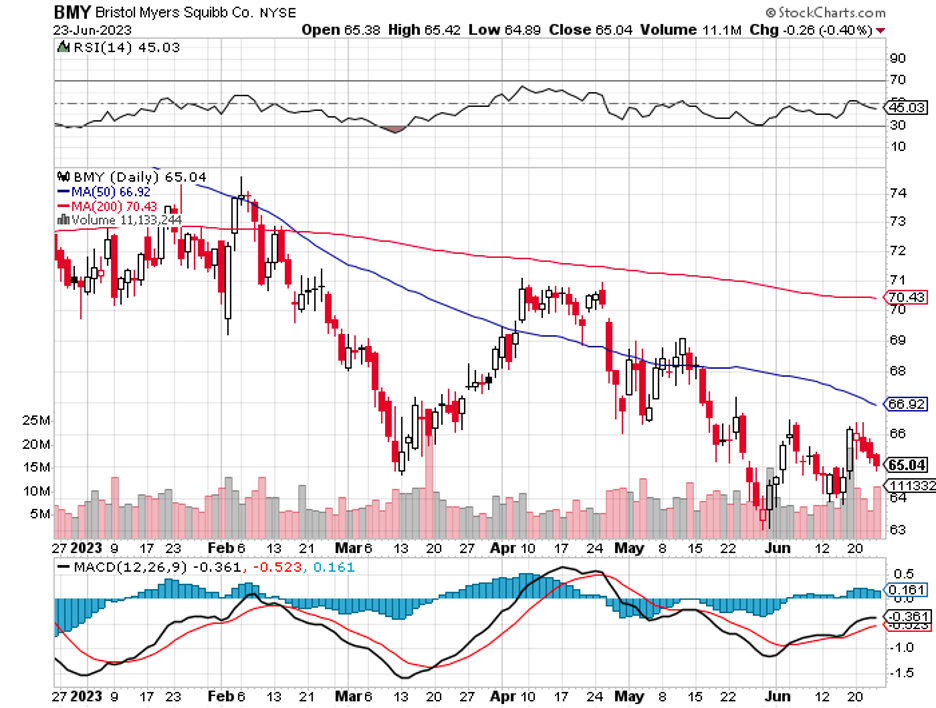Do you remember the 1999 cinematic sensation "The Matrix?" Neo, the protagonist, had a choice: swallow the red pill to wake up to reality or the blue one to slumber in illusion. Perhaps our market could do with a similar reality check—swallow the red pill and recognize the true value of companies with hefty margins and cash rivers.
After all, not so long ago, the markets were all singing praises for pharmaceutical stocks, idolizing them for their deep cash coffers and ironclad resilience against inflation.
But in the theater of investment, the curtain has suddenly dropped on them, as the market's affection has pirouetted towards the exuberant dance of AI stocks, evoking memories of the late '90s tech bubble.
Yet, for the savvy value investors in the audience, this shift is less of a tragedy and more of a golden intermission.
They now have a chance to secure prime seats at discounted prices, notably at the performance of the pharmaceutical powerhouse, Bristol Myers Squibb (BMY).
As the market narrative unfolded this year, BMY's plotline took a 9% twist, veering away from the 12% uptick of the S&P 500 (SPY). I've earlier peeked behind BMY's curtains, shedding light on its promising pipeline.
So why does BMY steal the spotlight?
Bristol Myers Squibb is not merely an actor but a maestro orchestrating symphonies in cardiovascular, oncology, and immunology sectors. The jewel in its crown is its leading role in the lucrative and burgeoning realm of immuno-oncology.
Behemoths like BMY have a magic wand—they can either acquire promising new drugs or cultivate them in their own labs, thanks to their deep wells of expertise.
BMY has been striking high notes with its margin, powered by star-performing drugs like the cancer-fighting Opdivo and cardiovascular medicine Eliquis, both of which enjoy patent protection until 2028.
In the last act (over three years), BMY has introduced nine new characters to its play, which are predicted to rake in a whopping $4 billion in this year's box office sales.
These factors ensure BMY's marquee stays lit. Notably, it has earned an A+ profitability grade, with sector-leading EBITDA margin and return on equity of 43% and 23%, respectively.
Even though the first quarter's revenue seemed to tread water YoY (with a 1% dip after adjusting for currency effects), BMY's newest cast members have outshone the rest. This is demonstrated by new product revenue that soared from $350 million YoY to a hefty $723 million in Q1.
Peering into the future, BMY's management anticipates that the revenue from these nine new stars will breathe new life into their portfolio, contributing between $10 billion and $13 billion in annual sales by 2025.
This troupe includes the cardiovascular prodigy, Camzyos, which has been stealing the limelight with promising efficacy data. Given its record thus far, we can expect a considerable upside to its fair value of $66.
Despite the looming specter of generic pressures, Bristol Myers Squibb is in the throes of a grand product launch.
Aside from Camyzos, the newly launched stars anticipated to push BMY to greater heights include cancer combatant Opdualag (an extension of the Opdivo franchise), hematologic treatments Reblozyl, Abecma, and Breyanzi, and immunological medications Sotyktu and Zeposia.
Bristol's multi-pronged attempts to capture significant market opportunities should help navigate the stormy seas of the long-term patent cliff.
As a finale, BMY flaunts a sturdy BBB-rated balance sheet, featuring a safe net debt to TTM EBITDA ratio of 1.5x. It offers a respectable 3.5% yield, and the dividend is comfortably protected by a 29% payout ratio, with a 5-year CAGR of 7%.
BMY also has a trick up its sleeve to return capital to shareholders tax-savvy via share buybacks, currently having $7 billion in remaining buyback authorization. At a forward PE of just 8.2, BMY essentially gets a 12% earnings yield on share buybacks.
Lastly, I find BMY to be priced just right at $65.66 with the aforementioned PE of just 8.2. This valuation seems unfairly low for a company with a strong line-up of newer drugs.
While only a modest 4% EPS growth is predicted for the company this year and low single-digit EPS growth over the next couple of years, BMY management could stir up the plot and boost the bottom line with share buybacks at the current discounted price.
BMY, currently being snubbed by investors, provides a fantastic opportunity for value and income investors to scoop up high-quality stocks at the perfect price.
Its robust balance sheet, high margins, and portfolio of new drugs all add up to make BMY a compelling long-term buy for investors.
With the stock priced at a discount and offering a well-covered, attractive yield, income and value, investors could see significant returns over the long term.


